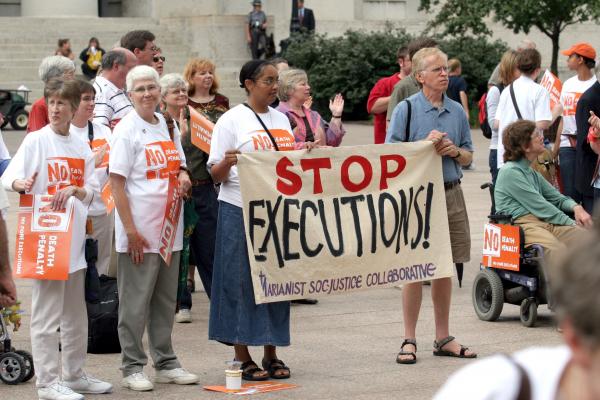In 2009, I accompanied my friend Steve Henley on his journey to execution in Tennessee. As his spiritual advisor, I was able to be with him for a few hours before he was removed from his deathwatch cell and strapped to a gurney. I was there with his family as the blinds were raised and as he tried to make them smile. I was there when he spoke his last words, when the poison entered his veins, when he began to turn blue, and when he finally was declared dead. This image of my friend, who I visited for 10 of his 23 years on death row, will stay with me forever. Steve’s execution lasted about 12 minutes.
Clayton Lockett’s execution lasted 43 minutes. All of those present at his execution — correctional staff, attorneys, media, the victim’s family, clergy, and others — will now live with the image of what happened in Oklahoma on Tuesday. The horror they witnessed will be with them forever, regardless of their opinion of Clayton Lockett. Though Oklahoma officials had all sorts of reasons to suspect that there might be problems with this execution — using an untested mixture of lethal injection drugs whose source was kept secret — they proceeded for the sake of expediency, leading to the inevitable cruelty that followed.
By all accounts, Clayton Lockett did a terrible thing. He shot and killed 19-year-old Stephanie Nieman in 1999, taking away her life and all its possibilities. Some might even say that Clayton Lockett got what he deserved for his crime. But was what the state of Oklahoma did on Monday really about Clayton Lockett?
In John 8, Jesus is confronted with a woman facing execution. She is guilty, and her execution is legal. When asked what to do with her, Jesus responds, “Let anyone who is without sin cast the first stone.” Jesus’ primary concern is not if this woman deserved to die but if those holding the stones deserved to kill her.
Jesus reminds us in this story that the death penalty actually says less about those who commit heinous crimes, and more about us. We are the ones holding the stones, confronted with how we will respond to someone who commits an act that offends our conscience and sparks our outrage. In the wake of murder, there is naturally horror, fear, and anger. But what do we do with these feelings? When we take human beings from prison cells where they may have spent decades, when we shackle their hands and feet, strap them to tables and kill them, is that really about them?
In my home state of Tennessee, 10 executions are scheduled over the next two years , beginning in October. Our state has executed only six people since 1960. Since 2007, four men have been released from Tennessee’s death row because it was finally determined that they were wrongfully convicted. Our state spends millions of dollars to maintain this broken system while Tennesseans with intellectual and developmental disabilities spend years on waiting lists for care, while one in four Tennessee children experiences food insecurity, and while murder victims’ families needs all too often go unmet.
Editor's Note: Click here to join Shane Claiborne in sending a message encouraging the Tennessee governor to pray with the 10 men on death row — a step in the right direction toward ending a culture of killing.
In 2013, Tennessee’s legislature passed a law making confidential the source of our state’s lethal injection drugs. And during Holy week of this year, the state legislature passed another law to mandate the use of the electric chair if these drugs become unavailable. Such attempts to “fix” the system are futile. They do nothing but create more frustration, more litigation, more expense, and more suffering.
On the evening that my friend Steve Henley was executed, we read Scripture and prayed together. We shared the Lord’s Supper through steel bars. Steve looked up and said, “You know, Stacy, I am a lucky man.” This man who was less than three hours from execution for a crime he always maintained he didn’t commit was calling himself lucky.
“Steve, what do you mean?”
“Well, even with all the bad that has happened to me, I know that there are folks in the free world ain’t never been loved the way I have. That makes me lucky.”
My eyes welled as I said, “I am not sure you are lucky, my friend, but you are loved.”
What happened during those 43 minutes in Oklahoma and what happens all over our nation when a human being is executed does not balance the scale of justice. Instead, it distorts. It demeans. It diminishes. God’s love in Christ never gives up. It redeems. It reconciles. It resurrects. God’s timing is not our own. It is not measured in minutes but in possibility. In God’s time, there is no time for the death penalty.
Rev. Stacy Rector serves as Executive Director of Tennesseans for Alternatives to the Death Penalty (TADP) and is a member of the Presbytery of Middle Tennessee. She served as spiritual advisor to Steve Henley, an inmate on Tennessee's death row who was executed on February 4, 2009.
Image: Anti-death penalty rally, Robert J. Daveant / Shutterstock.com
Got something to say about what you're reading? We value your feedback!
